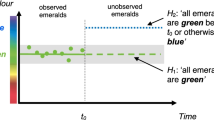Abstract
The issue of what distinguishes systems which have original intentionalityfrom those which do not has been brought into sharp focus by Saul Kripke inhis discussion of the sceptical paradox he attributes to Wittgenstein.In this paper I defend a sophisticated version of the dispositionalistaccount of meaning against the principal objection raised by Kripke in hisattack on dispositional views. I argue that the objection put by the sceptic,to the effect that the dispositionalist cannot give a satisfactory account ofnormativity and mistake, in fact comprises a number of distinct lines ofargument, all of which can be satisfactorily answered by the dispositionalist.
Two central problems raised by the sceptic consist in explaining (1) theextension of the term which a subject uses, and (2) the fact that the subjectintends to use the term with that extension, and is thus justified in her use.I adapt a suggestion of Blackburn's, that the extension of a word is fixed bya person's extended first-order dispositions to use it, and suggest that thereis no coherent possibility of a subject being disposed to makesystematic mistakes in connection with many ordinary words; the scepticalproblem does not apply in the same way throughout language. It is furtherargued that an account which appeals to a subject's second-orderdispositions to maintain a consistent pattern of extended first-orderdispositions to use words is able to provide a naturalistic basis to answerthe normative questions about justification of use. Three other variants ofthe mistake objection which are also revealed by a careful examination ofKripke's arguments are distinguished and it is shown that the dispositionalisthas adequate resources to meet them.
The appeal to second-order dispositions provides a principled way ofdistinguishing between those systems (animal or machine) which have originalintentionality, and those which do not.
Similar content being viewed by others
Explore related subjects
Discover the latest articles, news and stories from top researchers in related subjects.References
Blackburn, Simon (1984). ‘The Individual Strikes Back’. Synthese 58: 281–301.
Boghossian, Paul (1989). ‘The Rule–Following Considerations’. Mind 98: 507–549.
Coates, Paul (1986). ‘Kripke's Sceptical Paradox: Normativeness and Meaning’. Mind 95: 77–80.
Dennett, Daniel (1987). The Intentional Stance. Cambridge, MA: MIT Press.
Dretske, Fred (1988). Explaining Behaviour. Cambridge, MA: MIT Press.
Fodor, Jerry (1987). Psychosemantics. Cambridge, MA: MIT Press.
Fodor, Jerry (1990). A Theory of Content. Cambridge, MA: MIT Press.
Fodor, Jerry (1991). ‘Replies’, in Loewer, Barry and Rey, Georges (eds), (1991) Meaning and Mind: Fodor and his Critics. Oxford: Blackwell.
Fodor, Jerry (1994). The Elm and the Expert. Cambridge, MA: MIT Press.
Ginet, Carl (1992). ‘Answering Kripke's Objections ’in French, P., Uehling, T. E. and Wettstein, H. K. (eds), (1992) Midwest Studies in Philosophy 17: The Wittgenstein Legacy. Notre Dame: University of Notre Dame Press.
Goldfarb, Warren (1985). ‘Kripke on Wittgenstein on Rules’. Journal of Philosophy 82: 471–488.
Heil, John and Mele, Alfred, (eds) (1993). Mental Causation. Oxford: Clarendon Press.
Hoffman, P (1985). ‘Kripke On Private Language’. Philosophical Studies 47: 23–28.
Horgan, Terence (1991). ‘Actions, Reasons, and the Explanatory Role of Content’, in B. McLaughlin (ed.). (1991) Dretske and his Critics. Oxford: Blackwell.
Kim, Jaegwon (1991). ‘Dretske on How Reasons Explain Behaviour’, in B. McLaughlin (ed.). (1991) Dretske and his Critics. Oxford: Blackwell.
Kripke, Saul (1982). Wittgenstein on Rules and Private Languages, Oxford: Blackwell.
McGinn, Colin (1984). Wittgenstein On Meaning, Oxford: Blackwell.
Millikan, Ruth Garrett (1989a). ‘In Defence of Proper Functions’. Philosophy of Science 56, no. 2: 288–302.
Millikan, Ruth Garrett (1989b). ‘Propensities, Exaptations, and the Brain’ in her (1993) White Queen Psychology and Other Essays for Alice, Cambridge MA: MIT Press.
Millikan, Ruth Garrett (1989c). ‘Biosemantics’. Journal of Philosophy 86: 281–297.
Millikan, Ruth Garrett (1993). ‘White Queen Psychology; or, The Last Myth of the Given’, in her (1993) White Queen Psychology and Other Essays for Alice, Cambridge MA: MIT Press.
Papineau, David (1987). Reality and Representation, Oxford: Blackwell.
Papineau, David (1993). Philosophical Naturalism, Oxford: Blackwell.
Pettit, Philip (1990). ‘The Reality of Rule–Following’. Mind 99: 1–21.
Rey, Georges (1991–92). ‘Semantic Externalism and Conceptual Competence’. Proceedings of the Aristotelian Society 112: 315–331.
Sartorelli, Joseph. (1991) ‘McGinn on Content Scepticism and Kripke's Sceptical Argument’. Analysis 51: 79–84.
Stabler, Edward (1987). ‘Kripke on Functionalism and Automata’, Synthese 70: 1–22.
Author information
Authors and Affiliations
Rights and permissions
About this article
Cite this article
Coates, P. Meaning, Mistake and Miscalculation. Minds and Machines 7, 171–197 (1997). https://doi.org/10.1023/A:1008207502580
Issue Date:
DOI: https://doi.org/10.1023/A:1008207502580



